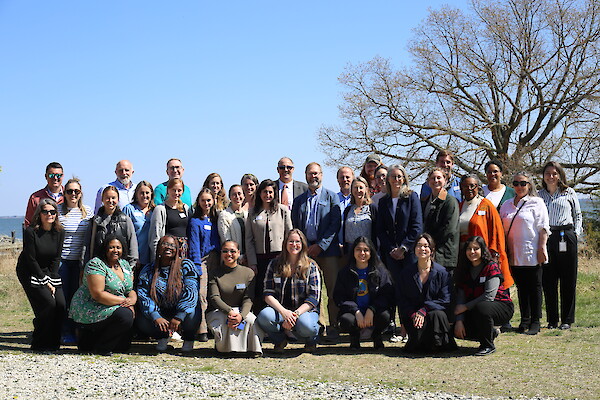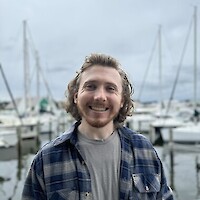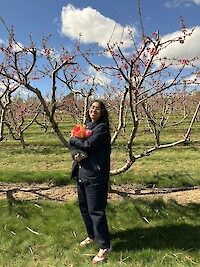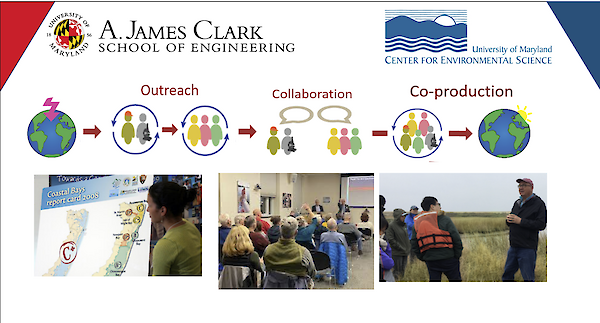Shaping the future of the Chesapeake Bay Report Card

IAN partnered with the Chesapeake Bay Foundation (CBF) to host a workshop on April 1 at CBF’s Philip Merrill Environmental Center in Annapolis. The event brought together environmental professionals from across the region to inform the development of the annual Chesapeake Bay and Watershed Report Card (CBWRC). After a networking lunch, participants heard remarks from Dr. Bill Dennison, Professor of Marine Science and Vice President for Science Application at the University of Maryland Center for Environmental Science, and Hilary Falk, President and CEO of CBF. Attendees then broke into groups to discuss the role of watershed report cards, their alignment with ongoing work, and potential new indicators. The workshop concluded with a collaborative stakeholder mapping activity, offering valuable insights to guide future CBWRC efforts and improve communication around the region’s socio-environmental health. Moving forward, our goal is to continue engaging stakeholders to help create a CBWRC that accurately reflects the health of the environment and the communities that depend on it.
Farewell, Joe!

Last month, IAN bid a fond farewell to Assistant Science Communicator Joe Edgerton. During his time with us, Joe brought a thoughtful, analytical approach to every project, helping to translate complex scientific information into clear, accessible insights. His commitment to collaboration and effective communication made him a valued team member and a trusted voice in our engagement and educational efforts. He played a key role in several projects, including the Chesapeake Bay Report Card, IAN Report Card, Southeast Michigan Report Cards, and the National Park Service Resource Briefs. We are grateful for Joe’s dedication and impact, and we wish him the very best in his future endeavors. His next chapter is sure to be just as impactful.
Meet the Scientist Series: Roshni Nair-Gonzalez

Hi everyone, my name is Roshni Nair-Gonzalez, and I am a science communicator at IAN. As a young person growing up in New York, I always gravitated towards art and the sciences. In fact, I was so involved in both that I was awarded a spot in the “art hall of fame” at my high school for my scientific illustrations. I graduated from CUNY Brooklyn College with a bachelor's degree in urban sustainability with a concentration in environmental science. During my undergraduate studies, I was also a part of an artist collective and did bi-weekly shows.
I started working with elementary schools teaching environmental science to 8-10 year olds through hands-on experiences such as farming a small plot on the world's largest rooftop garden at Brooklyn Grange. As a science teacher and artist, I was always eager to combine my interests, eventually leading to getting my Master's in Landscape Architecture from The Ohio State University. After working as a landscape designer for a little while, I came to IAN, eager to work on passing on the knowledge of science through visual communication and art.
Since I started at IAN 2 years ago, I have had the honor of working with a variety of scientists, stakeholders, and creative people all over the world who are working to make impactful change on the state of our environment through communicating their work, values, and purpose. I am thrilled to continue my work at IAN and offer my talents and time to more meaningful projects.
If you value research like Roshni's, consider donating to IAN here.
Peer-reviewed publications out now
Please check out these two journal articles that have been recently accepted:
- Implications of improved remote sensing capabilities on blue carbon quantification (Estuarine, Coastal and Shelf Science, Jonathan Lefcheck)
- Evaluating the effectiveness of field-based probiotic treatments for stony coral tissue loss disease in southeast Florida, USA (Frontiers in Marine Science, Jonathan Lefcheck)
Expand your skillset with our latest professional certificate

An exciting new Professional Certificate in Environmental Project Management was recently launched. Scientists from the University of Maryland Center for Environmental Science partnered with engineers from the University of Maryland College Park to co-develop training materials for learners interested in developing leadership skills in environmental project management. This unique combination of skill sets will aid both early career and senior practitioners. The Professional Certificate includes the following courses:
- Stakeholder Outreach: Effective Communication of Complex Environmental Threats
- Stakeholder Collaboration: Organizing for Environmental Justice and Equitable Solutions
- Co-Production: Addressing Complexity with Environmental Adaptive Management